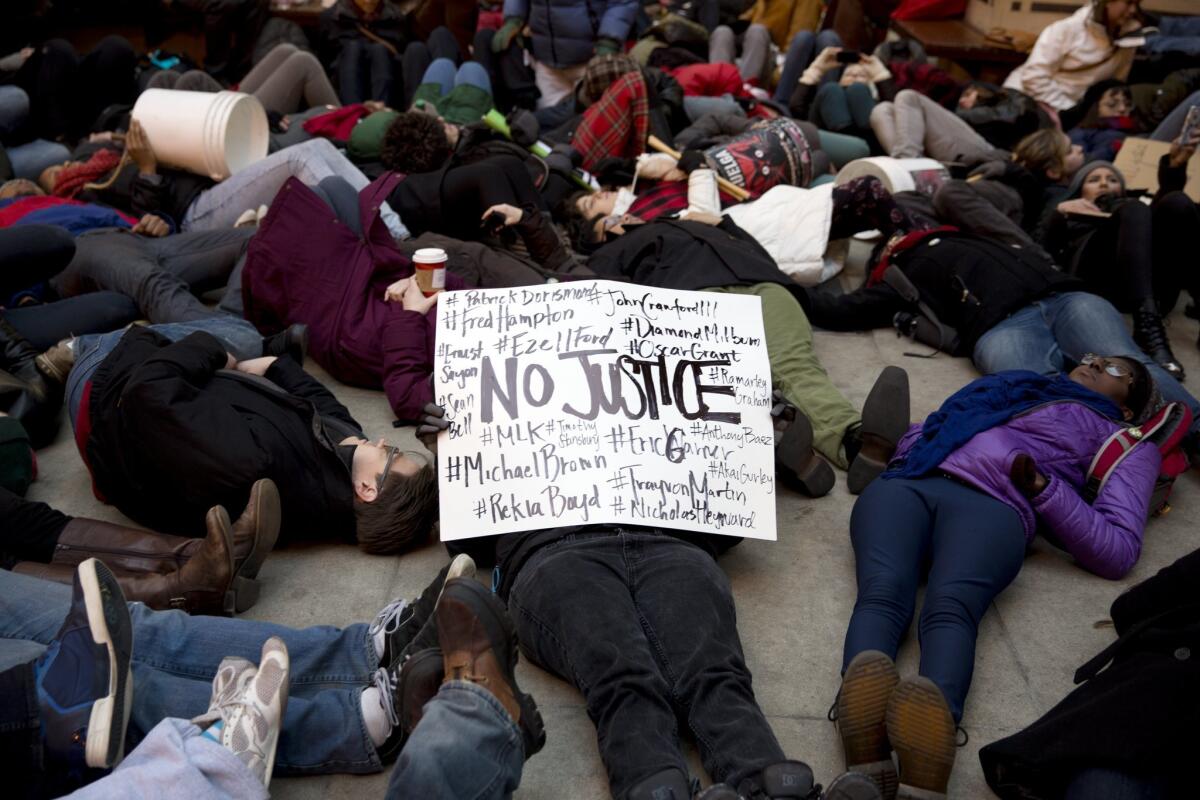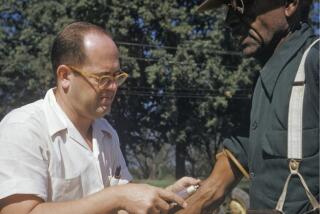Poll: Americans have sharply differing views of Brown, Garner cases

- Share via
Decisions by grand juries to not indict police officers involved in the deaths of black men in Ferguson, Mo., and New York City have drawn very different reactions from Americans, particularly whites, according to a poll released Monday.
By 50%-37%, Americans said a grand jury made the right decision in not indicting Officer Darren Wilson in the shooting death of 18-year-old Michael Brown in Ferguson, according to the survey by the Pew Research Center.
But by 57%-22%, Americans said a grand jury in New York made the wrong decision in not indicting a police officer in the death of Eric Garner, who died after the officer apparently choked him while attempting to arrest him for selling untaxed cigarettes.
Almost half of Americans, 48%, said race was “not a factor at all” in the Ferguson case. A smaller share, 39%, said they thought race played no role in the Garner case, with a larger percentage saying they were uncertain.
Similar percentages of Americans said race was a factor in both cases, with slightly more than one-quarter of those polled saying race was a “major factor” in each case and another 16% saying it was a “minor factor.”
The difference in views of the two cases is divided almost entirely along racial lines.
Black Americans overwhelmingly disapproved of the grand juries’ decisions in both cases, and almost two-thirds of blacks believed that race played a major role in each decision.
White Americans, by contrast, supported the grand jury’s decision in the Ferguson case, 64%-23%, but disapproved of the outcome in the Garner case, with 47% saying the grand jury made the wrong decision, 28% saying it was correct and 25% expressing no opinion.
Three-fifths of whites said they believed race played no role in the Ferguson outcome, but fewer than half, 48%, said that about the Garner case.
Those who believed race played a role in the grand juries’ decisions were much more likely to say that the decisions were wrong, particularly in the Ferguson case. In both cases, the overwhelming share of those who said race was not a factor said they believed the grand juries had made the right decisions.
Several circumstances could factor into the different reactions to the two cases. Garner’s death was captured on video, while Brown’s was not. Moreover, in the Ferguson case, witness accounts have differed over whether Brown charged toward the police officer, who testified he shot the young man because he feared for his life. In the Garner case, there is no allegation that he tried to attack the arresting officer.
The poll also found that about half of blacks said they expected relations between police and local communities to worsen in the next year. Among whites, the largest group, 43%, said they expected relations between police and local communities to stay about the same, with about one-third expecting relations to worsen.
The survey also showed a sharp decline in the percentage of blacks and of young adults who approve of President Obama’s handling of race relations. His approval rating on racial issues dropped 16 percentage points among blacks and 15 points among Americans aged 18-29 compared with a similar Pew poll taken in August.
The Pew survey, conducted for USA Today, was taken Wednesday through Sunday among a sample of 1,507 Americans aged 18 or older. The margin of error for the full sample is +/- 2.9 percentage points.
A separate NBC/Marist poll conducted Thursday and Friday also found sharp racial divides in attitudes about the two cases. More than four-fifths of black Americans said they believed law enforcement applied different standards to whites and blacks. Whites were more split on that, with 51% saying they did not believe there were separate standards versus 39% who said there were.
A large majority of whites, nearly four-fifths, said they had confidence that police in their communities would not use excessive force. A majority of blacks, 52%, said they had “just some” or “very little” confidence in that idea.
For more on politics and policy, follow @DavidLauter on Twitter.
More to Read
Sign up for Essential California
The most important California stories and recommendations in your inbox every morning.
You may occasionally receive promotional content from the Los Angeles Times.














